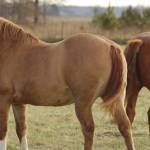Not All Obese Horses Have Insulin Resistance

Insulin resistance affects many overweight horses and ponies, potentially resulting in life-threatening bouts of laminitis. Certain breeds seem to be more prone to the condition than others, including easy keepers such as Andalusians. But, according to a Spanish research team, simply being overweight does not necessarily mean horses are resistant to the effects of insulin, the key hormone involved in controlling blood sugar levels.
Based on their research involving 164 Andalusians presented at the latest British Equine Veterinary Congress*, Martin Gimenez and coworkers reported the following:
- About 27% of included horses were obese (BCS >7) and had a cresty neck;
- The remaining horses were either not obese but still had a cresty neck (42%) or were neither obese nor cresty (31%);
- As expected, obese horses had higher insulin levels than non-obese horses, which can be indicative of developing or established insulin resistance, however; and
- The number of obese horses with a cresty neck that were diagnosed with elevated insulin levels and other clinical evidence of insulin dysregulation was very low overall (<10%).
“These findings support the suggestion that some horses can be overweight and healthy, showing no signs associated with abnormal insulin dynamics,” noted Kathleen Crandell, Ph.D., a Kentucky Equine Research nutritionist.
That said, there are still perils associated with obesity, including osteoarthritis, decreased ability to thermoregulate, and exercise intolerance, and laminitis can develop even without the presence of a decreased sensitivity to insulin.
Consult an equine nutritionist to tweak your horse’s diet to achieve and maintain an ideal BCS. Start a conversation here.
*Martin Gimenez, T., C.N. Aguirre Pascasio, and I. de Blas Giral. 2015. Basal insulin and insulin dysregulation in obese and non-obese Andalusian horses with and without cresty neck. British Equine Veterinary Association Congress 2015. Equine Veterinary Journal. 47(suppl 48): 23.








